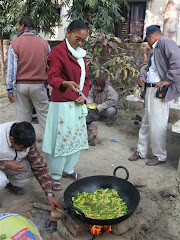We were comforted to read in the newspaper this week that ‘Power cuts likely to end after 5 years’. Meanwhile we have established a routine for coping with the scheduled cuts, but it’s very disappointing when the power comes on at 8am to have a power failure at 8:05 as I put bread in the toaster in the morning (twice this week). Most other news concerns the elections ‘CA polls must go ahead as planned’; ‘CA polls impossible with Terai unrest’; ‘Madhesi agitation threatens to disrupt CA polls’ – and so on. Many political marches and demonstrations this week. David’s schools are increasingly affected by bandhs, and the next phase of ETC training has been postponed until after the election (if it happens). In spite of the difficulties we have had a productive week, with the action research project approved and funded, David’s production of sets of low-cost teaching materials and both of us observing some good teaching.
I was surprised to meet another bideshi at the post office this week – an Irish student completing a PhD in agriculture and living and working with a family north of Biratnagar. He knew about us from our recent publicity.
A real treat this week was a visit to a school for the deaf, where Lilanath, one of the English teachers from the last group of trainees, works as a volunteer. We were up before dawn and at the ETC in grey early morning light at 7am. Durga met us (he is good at ‘English time’), but Umapati was suffering from ‘fever’ so stayed in bed. I rode of the back of Durga’s motorbike while David pedalled furiously to keep us in sight as we went to collect Tulsi. Of course we had to stay for tea before setting off into the countryside. Durga’s motorcycling ability is in the early stages of development, and he can only stop and start suddenly; that combined with the potholes makes for eventful journeys. We loved the school – 118 students in grades 1 – 10, with only 5 classrooms. There are 10 teachers – 2 of them deaf and all proficient in sign language. The students come from all over eastern Nepal and the school is largely funded by an NGO with minimal support from the government. Many of the students are orphans or were abandoned by their parents. 73 of them live in a hostel, with 9 rooms, 3 beds in each, 3 to a bed. They were bright eyed and excited by our visit. Signed questions flowed; teachers were enthusiastic and responsive. A splendid example of what is possible. A Japanese charity has funded a new building and hostel due to be completed soon. We will return.
Another treat was watching the new Indian film Taare Zameen Par (every child is special) that Umapati showed as part of his training session on inclusive education. See it if you can – it may even have subtitles in English; we coped surprisingly well without.
Govind was missing at the beginning of the week, as he is meeting prospective bridegrooms for his youngest daughter, Deepti. He favours a doctor from Janakpur, but the family are demanding a dowry of 15 lakh (about £10,000). He has no assets, so does not know what to do. I asked him who Deepti favours. She has just completed her masters degree, is very pretty, with a ‘wheatish’ (light coloured) complexion – a real asset!
And now preparations for a real holiday – we fly to New Delhi on Thursday where we will enjoy shopping in Khan Market (books, Fabindia, Anoukhi) before flying south to Kerala for a couple of weeks.
Subscribe to:
Comments (Atom)
.jpg)
.jpg)







.jpg)
.jpg)
.jpg)
















.jpg)



















